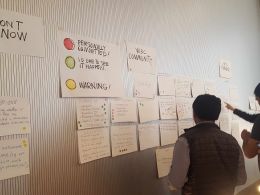
Ethereum Just Showcased the Full Power of Public Blockchains
In just one month, ethereum has managed to code, deploy, implement and adopt a decision while fully upholding minority rights without one metaphorical shot being fired, showcasing the full power of public blockchains and first class blockchain governance. In just one day, ethereum dispelled all myths and arguments against public blockchain’s inherent guarantee of rights – hard forks. The main argument, that controversial hardforks are a tyranny of the majority, was proven wrong when Ethereum Classic was provided with a market, thus giving the minority their full freedom. Likewise, any....
Related News
The most exciting thing to happen in the digital currency space since its invention is the controversial hardfork of Ethereum. Unlike much of what has gone before, the hardfork brings to the forefront an immense power of public blockchains, full freedom for all and free market based choice. There is, currently, a debate on whether the fork was successful or not. As we are in the mist of it, all we have is opinions. Mine is that the fork was the greatest achievement in this space since the invention of digital currencies. I’m sure, however, some will disagree, not without reason, but not....
A host of companies, nonprofits and consortiums gathered in London to discuss how the blockchain could be used to track solar power production across the globe, while Ethereum smart contracts could utilise the data. Democratization of energy. The ‘Chain-of-things IoT, Blockchain and Security Conference’, that took place in London on 1st June, saw the presentation of a full stack data-logger, that connects multiple blockchains to the digital output of solar energy plants. “We think we are onto something here; by connecting a data-logger that grabs solar energy output in near-real time and....
Armed with sky-high expectations and seemingly boundless enthusiasm for how tech could reinvent industry in the digital age, the "blockchain" industry has been overwhelmed with blockchains. Not only are there multiple open public blockchain projects, but legacy institutions and corporates are building exclusive permissioned blockchains. So far this year, there have been specialty blockchains created for everything from credit default swaps to managing global supply chains. It's unclear how these blockchains will need to interact with each other in the future to prove its....
The top banking regulator in the U.S. has announced that national banks and savings associations in the country can use public blockchains and stablecoins for payment activities. Experts say this is good for bitcoin and its importance should not be understated. Banks Can Use Public Blockchains and Stablecoins The Office of the Comptroller of the Currency (OCC) published an interpretive letter on Monday “clarifying national banks’ and federal savings associations’ authority to participate in independent node verification networks (INVN) and use stablecoins to conduct....
Vitalik Buterin is a programmer and writer. He founded Ethereum, a decentralized web 3.0 publishing platform, for which he won the World Technology Award in 2014. In this article, he explores the differences between public and private blockchains and the pros and cons of both. Over the last year, the concept of 'private blockchains' has become very popular in the broader blockchain technology discussion. Essentially, instead of having a fully public and uncontrolled network and state machine secured by cryptoeconomics (eg proof-of-work, proof-of-stake), it is also possible to create a....





